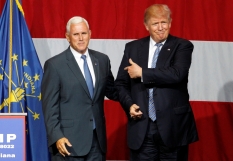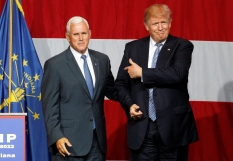It was in the spring of 1978, when he was a young man standing in a crowd at a Christian music festival in Asbury, Kentucky, that Mike Pence's life changed and so, effectively, did his denomination and the nature of his faith.
"I gave my life to Jesus Christ and that's changed everything," Pence told the Christian Broadcasting Network (CBN) in 2010.
Now the 57-year-old Republican candidate for Vice President and Donald Trump's running mate, the cradle Catholic is the only one of six siblings to have abandoned the Mother Church, becoming an evangelical while he was at Hanover College, a small liberal-arts school in Indiana.
He explained that his Catholic upbringing left him with a sense of something missing. "I began to meet young men and women who talked about having a personal relationship with Jesus Christ, and while I cherish my Catholic upbringing and the foundation that it poured in my faith, that had not been a part of my experience," Pence said to CBN.
The family, with its Irish roots, remains close, but Pence's departure from the Catholic Church has long been a source of disappointment to his mother, according to the priest who baptised him, the New York Times (NYT) has reported.
Pence was especially close to his maternal grandfather, who came to America from Ireland in 1923 before settling in Chicago as a bus driver, according to the NYT.
They idolised the first Irish Catholic president, John F Kennedy, and Pence began his career as a youth coordinator for the Bartholomew County Democrats.
"It may be that I grew up in a big Irish Catholic family like he [Kennedy] did," Pence told CBN. "Maybe it was that my grandparents were so proud of the first Irish Catholic president."
Pence was highly accustomed to church from a young age, attending six days a week at St.Columba, where he and his three brothers were altar boys, sometimes on duty during holidays.
"Our life revolved around the church," Gregory Pence, one of Pence's two older brothers, has said.
For years after his spiritual experience at the festival in Kentucky, Pence would describe himself as an "evangelical Catholic".
"He was part of a movement of people, I'll call it, who had grown up Catholic and still loved many things about the Catholic Church, but also really loved the concept of having a very personal relationship with Christ," Patricia Bailey, a close friend, told the NYT.
It was when at law school at Indiana University that Pence met his future wife, Karen, a fellow evangelical. She was so taken with Pence that after they started dating, she bought a gold cross with the word 'Yes' on it ready for when he proposed.
"She's been very much a part of his faith journey," another friend from the time, Mark Bailey, told the NYT. "He would refer to his wife as the prayer warrior of the family."
Today, Pence and his wife worship at College Park Church, an evangelical mega-church in Indianapolis.
Politically, Pence has been a classic moralising conservative as governor of Indiana since 2013, and throughout his twelve years as a member of the House of Representatives. He is a senior figure in the Republican establishment in his own right, having served as the chair of the House Republican Conference, the third highest-ranking Republican position.
And he has impeccable political evangelical credentials, having chaired the Republican Study Group, a coalition of conservative House Republicans.
Although he voted for Jimmy Carter in 1980, his break with the Democrats came with the era of Ronald Reagan in the 1980s, when Pence was attracted to the Republicans' anti-abortion position.
It is a stance that Pence is passionate about to this day. In March this year he signed a bill disallowing a woman to abort a foetus with a disability. "I sign this law with a prayer that God would continue to bless these precious children, mothers and families," he said.
Pence is also strongly opposed to gay marriage and campaigns to allow religious bodies to recognise gay couples and bodies to refuse to serve them.
Last March, controversially, he signed the Religious Freedom Restoration Act into law, allowing businesses to refuse to serve in certain circumstances over religious beliefs.
In an unusual concession, and under pressure from campaigners, he later signed an amendment stating that businesses could not discriminate against gay people. This, in turn, drew criticism from his conservative allies.
Pence is not without an independent mind: after Trump said he wanted to ban Muslims from entering the US, Spence tweeted that the idea was "offensive and unconstitutional".
A six-term US congressman for Indiana and current governor of Indiana, Pence is known in Washington as clean-spoken, polite and perhaps something of a prude.
For all these reasons, he is an inspired joint-ticket choice for Trump, a rough-talking playboy figure with a chequered personal life, two former wives and a casino empire who does not naturally appeal to America's Catholics and well-to-do conservatives.
As Indiana columnist Brian Howey put it, "Pence doesn't simply wear his faith on his sleeve, he wears the entire Jesus jersey."
If Pence does reach the White House as Vice President he will be the most overtly Christian seen there, at least since his old hero JFK occupied the Oval Office.
Conventional wisdom still backs Hillary Clinton, who has yet to declare her own running mate. But if Trump does succeed – far from impossible in these uncertain times – he will surely owe much to this outspoken believer who has leant a measure of credibility to Trump's campaign.
For although his positions are controversial, there is no doubting who is Pence's constant inspiration.
Returning to Indiana University in 2008, Pence said: "There was one other person I met during my years here who changed my life more than all the friends and family combined...Thirty years ago this spring, I embraced the truth." He was referring to Jesus.

















